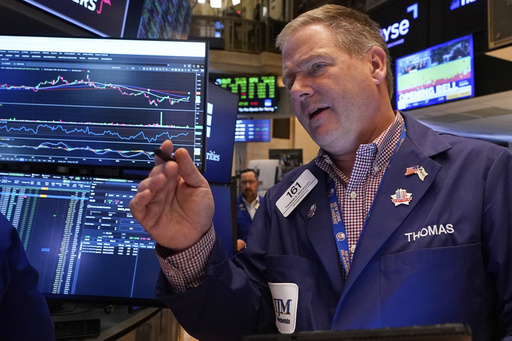NEW YORK — U.S. stocks saw minimal movement on Friday, bringing to a close what has been an unusually steady week for Wall Street.
The S&P 500 experienced a slight decline, down 0.1%, culminating in a weekly decrease of 0.5%. Notably, this is the first week in seven where the index, which plays a crucial role in numerous 401(k) plans, did not fluctuate beyond 1.5%. This period of relative calm follows recent volatility linked to concerns over President Trump’s trade war and the optimism surrounding potential tariff reductions.
Both the Dow Jones Industrial Average and the Nasdaq composite also edged down, the former falling 119 points, or 0.3%, while the latter saw a marginal increase of less than 0.1%. They concluded the week with slightly lesser declines compared to the S&P 500.
Financial markets are now gearing up for Saturday, which is anticipated to be pivotal. Key U.S. and Chinese representatives are scheduled to meet in Switzerland for their first discussions since the trade conflict initiated by Trump between these two economic superpowers. Investors and economists are wary, fearing that failing to secure trade agreements that significantly and swiftly reduce tariffs might lead to a recession.
On Friday, Trump suggested a potential tariff reduction on Chinese imports, moving from the current 145% rate down to 80%, although he specified that the decision rests with Treasury Secretary Scott Bessent, who will attend the meeting in Switzerland. While an 80% tariff would mark a decrease, it remains steep, causing a brief stir in financial markets, with U.S. stock futures momentarily dipping.
Markets, however, soon steadied as anticipation lingered over the outcomes of the U.S.-China talks. Trump also hinted at more impending trade deals with other nations, referencing his recently announced agreement with the United Kingdom.
“Many Trade Deals in the hopper, all good (GREAT!) ones!” he commented on his Truth Social platform.
As the flow of early-year earnings reports from companies begins to slow, their influence on the market persists.
Expedia’s shares dropped 7.3%, despite surpassing analysts’ profit expectations for the latest quarter. The company, which owns Vrbo and Hotels.com, cited an unexpected downturn in demand, specifically within the U.S., along with a nearly 30% decrease in Canadian bookings to the U.S. Comparable declines in travel demand have been observed by other companies, such as Hilton and Airbnb, in their recent earnings announcements.
Conversely, Lyft enjoyed a soaring 28.1% jump, as the company posted a stronger profit than forecasted. It also reported unprecedented weekly ridership in late March.
Taiwan Semiconductor Manufacturing Company (TSMC) delivered a positive report, noting a 48.1% increase in April revenue compared to the previous year, driving its U.S. stock up by 0.7%.
Insulet, a medical device company specializing in tubeless insulin pumps, saw its shares rise by 20.9%, marking the S&P 500’s largest gain. Strong quarterly results and an optimistic full-year revenue forecast boost its stock.
The day’s trading saw the S&P 500 dip 4.03 points to 5,659.91, the Dow Jones Industrial Average decrease by 119.07 to 41,249.38, and the Nasdaq composite inch up 0.78 to 17,928.92.
Overseas, European stock indices ticked up modestly following mixed outcomes in Asia. Hong Kong markets gained 0.4%, while Shanghai slipped by 0.3% after China reported an unexpectedly strong 8.1% increase in April exports, despite a more than 20% drop in exports to the U.S. due to heightened tariffs.
Meanwhile, the bond market saw the yield on the 10-year Treasury rise slightly to 4.38% from Thursday’s 4.37%.



